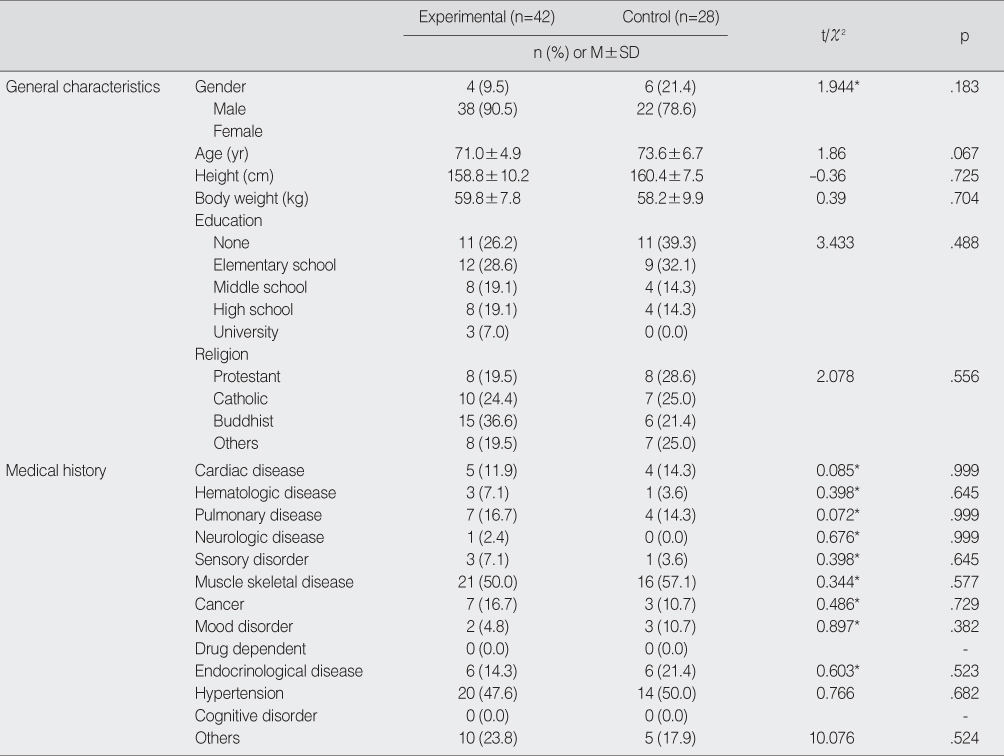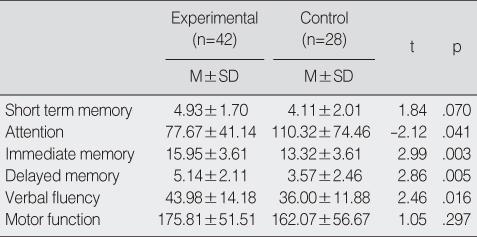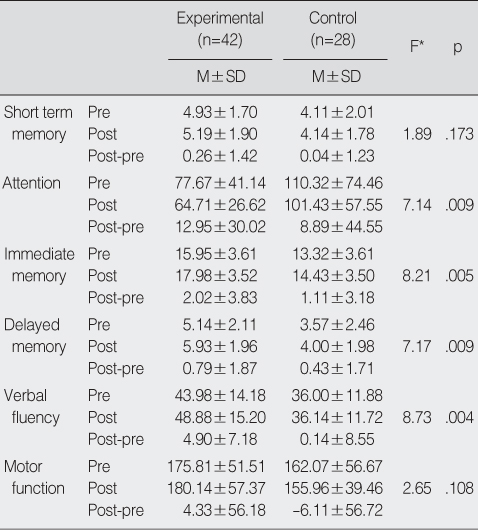Articles
- Page Path
- HOME > J Korean Acad Nurs > Volume 39(1); 2009 > Article
-
Original Article
- Effects of an Exercise Program on Frontal Lobe Cognitive Function in Elders
- Mee-Kyung Shin
-
Journal of Korean Academy of Nursing 2009;39(1):107-115.
DOI: https://doi.org/10.4040/jkan.2009.39.1.107
Published online: February 28, 2009
Full-time Instructor, Department of Nursing Science, Korea Nazarene University, Cheonan, Korea.
- Address reprint requests to: Shin, Mee-Kyung. Department of Nursing Science, Korea Nazarene University, 456 Ssangyong-dong, Cheonan 331-718, Korea. Tel: 82-41-570-7070, Fax: 82-41-570-4260, splash92@paran.com
Copyright © 2009 Korean Society of Nursing Science
- 1,296 Views
- 5 Download
- 12 Crossref
Abstract
-
Purpose
- The purpose of this study was to identify the effects of an exercise program on frontal lobe cognitive function in seniors.
-
Methods
- The participants were 42 seniors using a health center in Seoul (experimental group) and 28 seniors using a facility for elders in Seoul (control group). The exercise program was carried out for 16 weeks from April to August 2007. The frontal lobe cognitive function, which includes short term memory, attention, immediate memory, delayed memory, verbal fluency and motor function, was measured by the Digit Span Forward test, Trail Making test, Immediate recall words test, Delayed recall words, Controlled oral word association test and Finger tapping test. The collected data were analyzed by Fisher's exact test, Chi-square, t-test, and ANCOVA using the SAS program.
-
Results
- The major findings of this study were as follows: Attention (p=.009), immediate memory (p=.005), delayed memory (p=.009), and verbal fluency (p=.004) improved after the exercise program.
-
Conclusion
- In this study, the exercise program was effective in improving frontal lobe cognitive function in elders. So it provides basic information for further nursing education on exercise programs which will be effective for prevention of early cognitive function decline in normally aging elders.
- 1. Blumenthal JA, Emery CF, Madden DJ, Schniebolk S, Walsh-Riddle M, George LK, et al. Long-term effects of exercise on psychological functioning in older men and women. Journal of Gerontology. 1991;46:352–361.
- 2. Borg GA. Psycholophysical bases of perceived exertion. Medicine & Science in Sports & Exercise. 1982;14:377–381.
- 3. Cheon JS. Neurocognitive assessment of geriatric patients. Journal of Korean Society of Biological Therapies in Psychiatric. 2000;6:126–139.
- 4. Choe HG, Kim YS, Park HW, Lee JL, Oh SA, Park IS. The effect of tailored exercise of teenagers' obesity change. Paper presented at the spring meeting of the Korean Academy of Obesity. 2003;Seoul.
- 5. Choi KU. The effect of regular exercise on cognitive function, stress, depression and antioxidants in elderly women. 2004;Seoul, Korea University. Unpublished doctoral dissertation.
- 6. Cohen J. Statistical power analysis for the behavioral science. 1988;2nd ed. Hillsdale, NJ, Lawrence Erlbaum Association Publishing.
- 7. Colcombe S, Kramer AF. Fitness effects on the cognitive function of older adults: A meta-analytic study. Psychological Science. 2003;14:125–130.PubMed
- 8. Fuster JM. The prefontal cortex. 1989;2nd ed. New York, NY, Raven Press Publishing.
- 9. Hall CD, Smith AL, Keele SW. The impact of aerobic activity on cognitive function in older adults: A new synthesis based on the concept of executive control. European Journal of Cognitive Psychology. 2001;13:279–300.Article
- 10. Hogan BA. Physical and cognitive activity and exercise for older adults: Review. Journal of Aging and Human Development. 2005;60:95–126.PubMed
- 11. Kang YW. Cognitive changes in the frontal lobe across the life span. Paper presented at the meeting of the Korean Psychological Association. 2006;Seoul.
- 12. Kim HJ, Choi JM, Lee KM. Effects of combination training of resistance and walking exercise on the psychomotor performance in the elderly. Journal of Physical Growth and Motor Development. 2004;12:97–105.
- 13. Kim HS, Park UY. Senior Fitness Test. 2005;Seoul, Daehan Media Publishing.
- 14. Kim JS, Jeong IS, Kim YJ, Hwang SK, Choi BC. Screening for high risk population of dementia and development of the preventive program using web. Journal of Korean Academy of Nursing. 2003;33:236–245.ArticlePubMedPDF
- 15. Kim JS, Jung JS. The effect of a folk play program on cognition, ADL, and problematic behavior in the elderly with dementia. Journal of Korean Academy of Nursing. 2005;35:1153–1162.PubMed
- 16. Kim KU, Kim SY, Kim JH, Uh SI, Uh JI, Yoon JC, et al. Korean version of the consortium to establish a registry for Alzheimer's disease assessment packet. 2003;Seoul, Seoul National University Publishing.
- 17. Kim YS. The effect of cognitive ability and self esteem on regular exercise in the elderly. The Korean Journal of Physical Education. 2001;40:181–193.
- 18. Society Statistical Survey. Korean National Statistic Office. 2003;09 21 Retrieved from http://meta.kosis.kr/bzmt/main.jsp?surv_id=34&curYear=2003.
- 19. Statistics for the elderly. Korean National Statistic Office. 2008;10 01 Retrieved from http://www.nso.go.kr/board_notice/BoardAction.do?method=view&board_id=78&seq=574&num=574.
- 20. Korean NeuroPsychiatric Assocation. Dementia. 2002;Seoul, Chosunilbosa Publishing.
- 21. Kramer AF, Hahn S, Cohen NJ, Banich MT, McAuley E, Harrison CR, et al. Aging, fitness and neurocognitive function. Nature. 1999;400:418–419.ArticlePubMedPDF
- 22. Laurin D, Verreault R, Lindsay J, MacPherson K, Rockwood K. Physical activity and risk of cognitive impairment and dementia in elderly persons. Archives of Neurology. 2001;58:498–504.PubMed
- 23. Lee KM, Choi JM, Kim HJ. The effect of regular exercise training on cognitive function in the elderly women. Journal of Physical Growth and Motor Development. 2002;10:81–90.
- 24. Lipowski ZJ. Delirium updated. Comprehensive Psychiatry. 1980;21:190–196.ArticlePubMed
- 25. Lytle ME, Vander Bilt J, Pandav RS, Dodge HH, Ganguli M. Exercise level and cognitive decline: The Movies project. Alzheimer Disease & Associated Disorders. 2004;18:57–64.Article
- 26. Park TJ. Cognitive neural mechanism of aging. The Korean Journal of Experimental Psychology. 2004;16:317–336.
- 27. Rikli RE, Jones CJ. Senior fitness manual. 2001;Champaign, IL, Human Kinetics Publishing.
- 28. Roth CL. How to protect the aging work force. Occupational Hazards. 2005;67:52–54.
- 29. Ryu HS. A study on ADL and dementia of aged person with medicaid in Korea. Journal of Korean Academy of Nursing. 2001;31:236–245.
- 30. Seo HG. Elderly with dementia in the year 2007 is estimated about 400 thousand. 2007;09 20 Retrieved September 20, 2007. from http://app.yonhapnews.co.kr.
- 31. Van Gelder BM, Tijhuis MA, Kalmijn S, Giampaoli S, Nissinen A, Kromhout D. Physical activity in relation to cognitive decline in elderly men: The FINE study. Neurology. 2004;63:2316–2321.ArticlePubMed
REFERENCES
Figure & Data
REFERENCES
Citations

- Cognitive decline in thrombotic thrombocytopenic purpura survivors: The role of white matter health as assessed by MRI
F. Hannan, J. Hamilton, C. J. Patriquin, K. Pavenski, M. T. Jurkiewicz, L. Tristao, A. M. Owen, P. K. Kosalka, S. C. L. Deoni, J. Théberge, J. Mandzia, S. H. S. Huang, J. D. Thiessen
British Journal of Haematology.2024; 204(3): 1005. CrossRef - Effectiveness of an Exercise Program for Older Adults Using an Augmented Reality Exercise Platform: A Pilot Study
Tae Sung Park, Myung-Jun Shin
Annals of Geriatric Medicine and Research.2023; 27(1): 73. CrossRef - Influence of collateral circulation on cerebral blood flow and frontal lobe cognitive function in patients with severe internal carotid artery stenosis
Wei Wei, Xingyang Yi, Jianghai Ruan, Xiaodong Duan, Hua Luo, Zhiyu Lv
BMC Neurology.2019;[Epub] CrossRef - The effects of exercise on the structure of cognitive related brain regions: a meta-analysis of functional neuroimaging data
Guohua Zheng, Bingzhao Ye, Yuhui Zheng, Zhenyu Xiong, Rui Xia, Pingting Qiu, Jing Tao, Lidian Chen
International Journal of Neuroscience.2019; 129(4): 406. CrossRef - The effect of exercise combined with a cognitive-enhancement group training program on cognition and depression in the community-dwelling elderly
Hwan-hee Kim, Nam-hae Jung
Journal of Physical Therapy Science.2018; 30(2): 335. CrossRef - The effect of exercise on cognitive function in the elderly : A systematic review and meta-analysis
Bok Yae Chung, Ji Young Han
Journal of the Korean Data and Information Science Society.2016; 27(5): 1375. CrossRef - Effect of Net-Step Exercise on Gait Ability, Depression, Cognitive Function and Activities of Daily Living in Older Adults
Eun Ja Lee, Jae Boone Yoo
The Korean Journal of Rehabilitation Nursing.2016; 19(2): 108. CrossRef - The Effects of an Exercise Program using a Resident Volunteer as a Lay Health Leader for Elders' Physical Fitness, Cognitive Function, Depression, and Quality of Life
Yeon-Hee Choi, Na-Young Kim
Journal of Korean Academy of Community Health Nursing.2013; 24(3): 346. CrossRef - Effects of a Cognition Activation Program for the Institutionalized Old-Old in Korea
Hung Sa Lee, Dohyun Lee
Journal of Korean Academy of Community Health Nursing.2013; 24(4): 427. CrossRef - Long-term exercise treatment reduces oxidative stress in the hippocampus of aging rats
K. Marosi, Z. Bori, N. Hart, L. Sárga, E. Koltai, Z. Radák, C. Nyakas
Neuroscience.2012; 226: 21. CrossRef - The Effects of Exercise in the Frail Elderly
Young-Im Park, Kang-Yi Lee, Tae-Im Kim, Moung-Hee Jeon, Dong-Oak Kim, Ji-Hyun Kim
Journal of Korean Academy of Community Health Nursing.2012; 23(1): 91. CrossRef - The Effects of a Cognitive Enhancement Group Training Program for Community-dwelling Elders
Young Ran Han, Mi Sook Song, Ji Young Lim
Journal of Korean Academy of Nursing.2010; 40(5): 724. CrossRef
Research Design
Ye1, Ye2, Yc1, Yc2=frontal lobe cognitive function: short term memory, attention, immediate memory, delayed memory, verbal fluency, motor function; X=exercise program.
Exercise Program
Homogeneity of General Characteristics and Medical History of Two Groups (N=70)
*Fisher's exact test.
Homogeneity of Dependent Variables (N=70)
Comparison of the Frontal Lobe Cognitive Function of Two Groups (N=70)
*F-value of ANCOVA with pre-test value as covariate.
Ye1, Ye2, Yc1, Yc2=frontal lobe cognitive function: short term memory, attention, immediate memory, delayed memory, verbal fluency, motor function; X=exercise program.
*Fisher's exact test.
*F-value of ANCOVA with pre-test value as covariate.
 KSNS
KSNS
 E-SUBMISSION
E-SUBMISSION





 Cite
Cite

